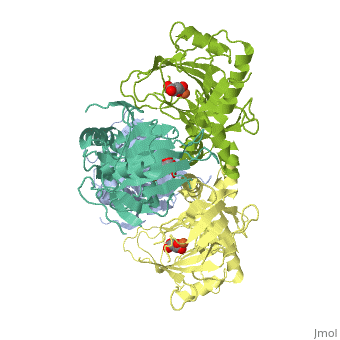1vz4
From Proteopedia
| Line 4: | Line 4: | ||
==Overview== | ==Overview== | ||
| - | The alkylsulfatase AtsK from Pseudomonas putida S-313 is a member of the | + | The alkylsulfatase AtsK from Pseudomonas putida S-313 is a member of the non-heme iron(II)-alpha-ketoglutarate-dependent dioxygenase superfamily. In the initial step of their catalytic cycle, enzymes belonging to this widespread and versatile family coordinate molecular oxygen to the iron center in the active site. The subsequent decarboxylation of the cosubstrate alpha-ketoglutarate yields carbon dioxide, succinate, and a highly reactive ferryl (IV) species, which is required for substrate oxidation via a complex mechanism involving the transfer of radical species. Non-productive activation of oxygen may lead to harmful side reactions; therefore, such enzymes need an effective built-in protection mechanism. One of the ways of controlling undesired side reactions is the self-hydroxylation of an aromatic side chain, which leads to an irreversibly inactivated species. Here we describe the crystal structure of the alkylsulfatase AtsK in complexes with succinate and with Fe(II)/succinate. In the crystal structure of the AtsK-Fe(II)-succinate complex, the side chain of Tyr(168) is co-ordinated to the iron, suggesting that Tyr(168) is the target of enzyme self-hydroxylation. This is the first structural study of an Fe(II)-alpha-ketoglutarate-dependent dioxygenase that presents an aromatic side chain coordinated to the metal center, thus allowing structural insight into this protective mechanism of enzyme self-inactivation. |
==About this Structure== | ==About this Structure== | ||
| Line 15: | Line 15: | ||
[[Category: Kertesz, M.]] | [[Category: Kertesz, M.]] | ||
[[Category: Mueller, I.]] | [[Category: Mueller, I.]] | ||
| - | [[Category: Stueckl, A | + | [[Category: Stueckl, A C.]] |
[[Category: Uson, I.]] | [[Category: Uson, I.]] | ||
[[Category: FE2]] | [[Category: FE2]] | ||
| Line 25: | Line 25: | ||
[[Category: self hydroxylation]] | [[Category: self hydroxylation]] | ||
| - | ''Page seeded by [http://oca.weizmann.ac.il/oca OCA ] on | + | ''Page seeded by [http://oca.weizmann.ac.il/oca OCA ] on Thu Feb 21 15:38:49 2008'' |
Revision as of 13:38, 21 February 2008
|
FE-SUCCINATE COMPLEX OF ATSK
Overview
The alkylsulfatase AtsK from Pseudomonas putida S-313 is a member of the non-heme iron(II)-alpha-ketoglutarate-dependent dioxygenase superfamily. In the initial step of their catalytic cycle, enzymes belonging to this widespread and versatile family coordinate molecular oxygen to the iron center in the active site. The subsequent decarboxylation of the cosubstrate alpha-ketoglutarate yields carbon dioxide, succinate, and a highly reactive ferryl (IV) species, which is required for substrate oxidation via a complex mechanism involving the transfer of radical species. Non-productive activation of oxygen may lead to harmful side reactions; therefore, such enzymes need an effective built-in protection mechanism. One of the ways of controlling undesired side reactions is the self-hydroxylation of an aromatic side chain, which leads to an irreversibly inactivated species. Here we describe the crystal structure of the alkylsulfatase AtsK in complexes with succinate and with Fe(II)/succinate. In the crystal structure of the AtsK-Fe(II)-succinate complex, the side chain of Tyr(168) is co-ordinated to the iron, suggesting that Tyr(168) is the target of enzyme self-hydroxylation. This is the first structural study of an Fe(II)-alpha-ketoglutarate-dependent dioxygenase that presents an aromatic side chain coordinated to the metal center, thus allowing structural insight into this protective mechanism of enzyme self-inactivation.
About this Structure
1VZ4 is a Single protein structure of sequence from Pseudomonas putida with and as ligands. Known structural/functional Site: . Full crystallographic information is available from OCA.
Reference
Succinate complex crystal structures of the alpha-ketoglutarate-dependent dioxygenase AtsK: steric aspects of enzyme self-hydroxylation., Muller I, Stuckl C, Wakeley J, Kertesz M, Uson I, J Biol Chem. 2005 Feb 18;280(7):5716-23. Epub 2004 Nov 12. PMID:15542595
Page seeded by OCA on Thu Feb 21 15:38:49 2008

